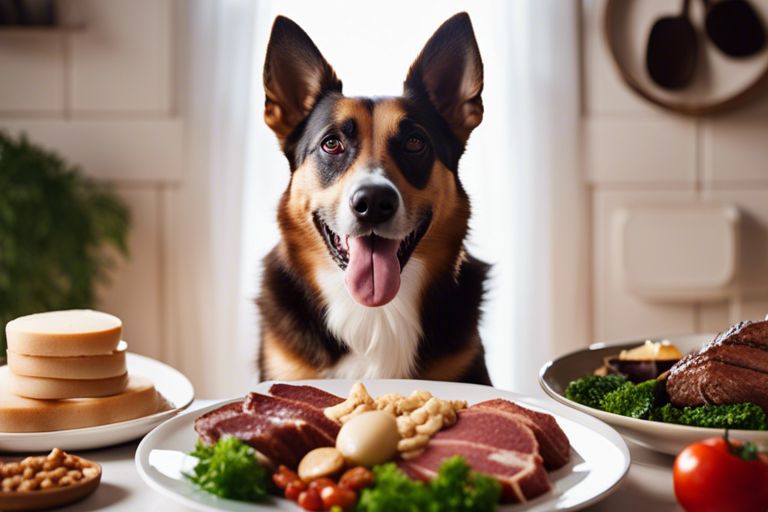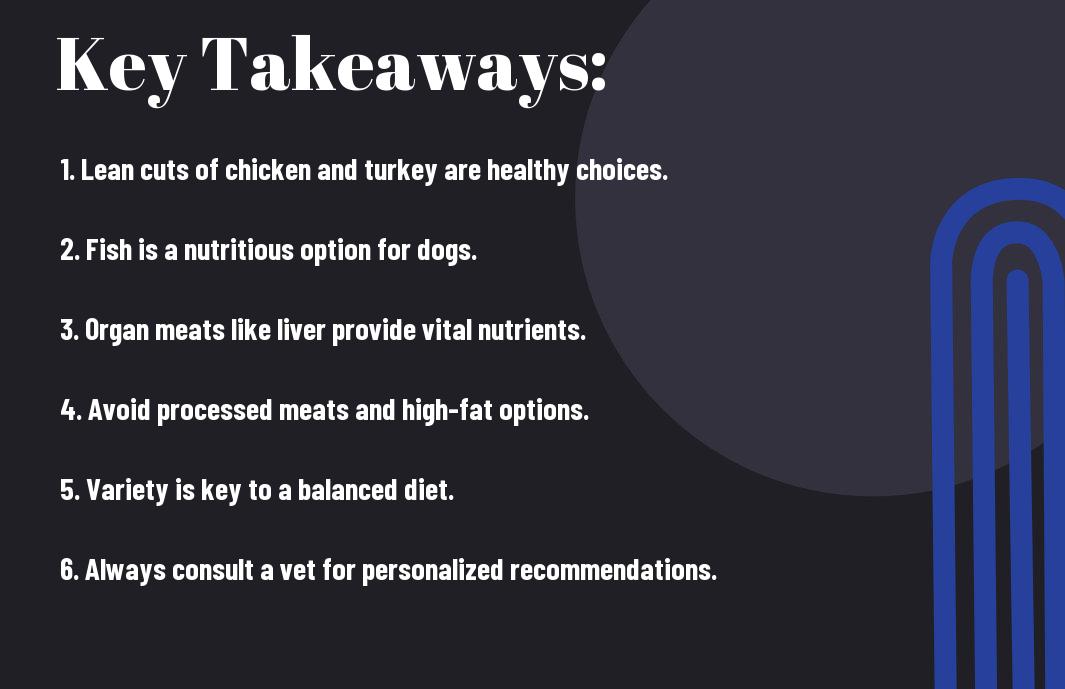Turkey, chicken, beef, or fish – when it comes to choosing the healthiest meat for your furry friend, it’s important to consider not only taste but also nutritional value. In this informative blog post inspired by Dr. Temple Grandin’s expertise, we will explore the benefits of different meats for dogs, helping you make the best choice for your canine companion’s health and well-being.
Key Takeaways:
- Lean meats such as chicken, turkey, and venison are good options for dogs as they are lower in fat and calories.
- Organ meats like liver and heart provide important nutrients like vitamins A, B, and iron necessary for your dog’s overall health.
- Fish is a healthy protein source for dogs, rich in omega-3 fatty acids that promote a shiny coat and healthy skin.
- Lean cuts of beef and lamb can also be good choices for dogs, providing quality protein without excess fat.
- It’s crucial to consult with a veterinarian to determine the best meat options for your dog based on their individual health needs and dietary requirements.
Nutritional Requirements
While exploring the healthiest meat options for your furry friends, it’s crucial to understand their overall nutritional requirements. Just like humans, dogs need a balanced diet to thrive and stay healthy. Referencing the Top 10 Healthiest Human Foods That Dogs Can Eat can provide insights into incorporating nutritious elements into their meals.
Protein Content
An crucial component of a dog’s diet is protein. Dogs are categorically omnivores, although they exhibit some carnivorous traits, making protein a crucial element. High-quality animal protein sources such as lean meats like chicken, turkey, and fish are optimal for maintaining your dog’s overall health and well-being.
Fat Content
With dogs requiring fat for energy and overall body function, the type and amount of fat in their diet are significant. Opt for sources of healthy fats like those found in salmon or flaxseed, as they offer vital nutrients such as omega-3 fatty acids. Maintaining a proper balance of fats in your dog’s diet is key to their energy levels and overall health.
Understanding the balance of fats in your dog’s diet is crucial. Too much fat can lead to obesity and health issues, while too little fat may result in a lack of energy and crucial nutrients for your furry companion. Consult with a veterinarian to determine the optimal fat content for your dog’s specific needs.
Vitamins and Minerals
One of the key factors in choosing the healthiest meat for your dog is considering the vitamins and minerals they need for overall health. Incorporating a variety of meats in their diet can ensure they receive a diverse array of crucial nutrients. From beef to lamb, each meat source offers a unique set of vitamins and minerals that contribute to your dog’s overall well-being.
One crucial aspect to remember is that different meats provide varying levels of vitamins and minerals, so a balanced diet with a mix of meats can help cover all bases. Vitamin-rich meats like liver can be beneficial, while mineral-packed options like chicken can also play a vital role in meeting your dog’s nutritional requirements.
Types of Meat
Clearly, when it comes to choosing the healthiest meat for your dog, it’s necessary to consider the different types available. Each type of meat offers various nutritional benefits for your furry friend. Below is a breakdown of the most common types of meat for dogs:
| Red Meat | Poultry |
|---|---|
| Beef | Chicken |
| Lamb | Turkey |
| Pork | Duck |
Red Meat (Beef, Lamb, Pork)
Any red meat, such as beef, lamb, or pork, can be a good source of protein and necessary nutrients for your dog. Red meats are rich in iron, zinc, and B vitamins, which are crucial for your dog’s overall health. When choosing red meat for your dog, opt for lean cuts to avoid excess fat intake, which can lead to obesity and other health issues. After all, moderation is key when it comes to feeding red meat to your furry friend.
Poultry (Chicken, Turkey, Duck)
Chicken, turkey, and duck are popular poultry options for dogs due to their lean protein content and digestibility. Poultry meats are generally lower in fat compared to red meats, making them a suitable choice for dogs prone to weight gain. Additionally, poultry is rich in amino acids, which are necessary for maintaining your dog’s muscle mass and overall wellness. It is important to cook poultry thoroughly to eliminate any harmful bacteria that could be present in raw meat.
It is worth noting that some dogs may have allergies or sensitivities to certain types of meat, so it’s crucial to monitor your dog’s reaction when introducing a new protein source into their diet. Additionally, always consult with your veterinarian before making any significant changes to your dog’s diet to ensure it meets their specific nutritional needs.
Fish and Seafood (Salmon, Cod, Shrimp)
Fish and seafood, such as salmon, cod, and shrimp, are excellent sources of omega-3 fatty acids, which are beneficial for your dog’s skin, coat, and joint health. Poultry Fish and seafood also provide high-quality protein and necessary nutrients like vitamin D and selenium. When feeding fish to your dog, be cautious of bones and ensure it is cooked thoroughly to avoid any potential risks of foodborne illnesses.
Understanding the nutritional benefits of different types of meat can help you make informed decisions when choosing the healthiest options for your dog. By incorporating a variety of meats into your dog’s diet, you can ensure they receive a well-rounded and balanced nutrition to support their overall well-being.
Benefits of Different Meats
Now, before we explore into the specifics of the healthiest meat for dogs, it’s important to understand the benefits of incorporating various meats into your furry friend’s diet. If you want to learn more about healthy meat choices for dogs such as beef, chicken, duck, turkey, and lamb, check out this Healthy Meat for Dogs: Beef, Chicken, Duck, Turkey, Lamb … resource.
High-Protein Meats (Venison, Buffalo)
Benefits:
High-protein meats like venison and buffalo can be excellent options for dogs, especially those with active lifestyles or specific dietary needs. Protein is crucial for muscle development, repair, and overall health. These meats are lean and packed with important amino acids, making them a great source of energy for your canine companion.
Low-Fat Meats (Chicken Breast, Turkey Breast)
Meats:
It is important to consider incorporating low-fat meats like chicken breast and turkey breast into your dog’s diet to maintain a healthy weight and support their cardiovascular health. These meats are rich in protein while being lower in fat content, making them ideal choices for pups that may need to watch their calorie intake.
Omega-Rich Meats (Salmon, Sardines)
An Omega-Rich Meats:
Omega-rich meats such as salmon and sardines are fantastic options to enhance your dog’s diet with important fatty acids. Omega-3 fatty acids play a crucial role in skin health, coat conditioning, and may even offer anti-inflammatory benefits. Incorporating these meats into your dog’s meals can contribute to their overall well-being.
LowFat
Common Allergies and Sensitivities
Not sure what type of meat is the healthiest for your dog? Consult our article on What Are the Best Meats for Dogs? to make an informed choice for your furry friend.
Beef Allergies
An allergy to beef is not uncommon in dogs. Symptoms of a beef allergy can include skin issues, digestive problems, and even ear infections. If you notice these signs after feeding your dog beef, it’s best to consult your veterinarian for suitable alternatives.
Chicken Allergies
Allergies to chicken are another common issue for dogs. Symptoms of a chicken allergy can manifest as itching, gastrointestinal upset, and skin irritation. If your dog shows signs of a chicken allergy, consider switching to alternative protein sources like turkey or duck to see if symptoms improve.
An elimination diet may be recommended by your vet to identify the exact ingredient causing the allergic reaction. This process involves removing the suspected food, like chicken, from your dog’s diet and gradually reintroducing it to pinpoint the allergen.
Fish and Seafood Allergies
One of the healthy meat options, fish and seafood, can also trigger allergic reactions in some dogs. While fish is often considered a novel protein for pets with allergies, it’s vital to monitor your dog for any adverse reactions after introducing it into their diet.
To ensure your dog’s optimal health, always consult with your veterinarian before making significant changes to their diet, especially when addressing food allergies or sensitivities.
Cooking and Preparation Methods
Raw Feeding
Feeding your dog a raw diet has become increasingly popular among pet owners. Advocates of raw feeding believe that it mimics what a dog’s ancestors would have eaten in the wild, offering numerous health benefits. However, it’s important to ensure that a raw diet is balanced and complete, incorporating a variety of meats, organs, and bones to provide necessary nutrients.
Cooking Methods (Grilling, Roasting, Boiling)
The cooking method you choose can impact the nutritional value of the meat you feed your dog. Grilling, roasting, and boiling are common methods used to prepare meat for dogs. Grilling can help to retain more nutrients compared to boiling, while roasting can add flavor without the need for additional fats or oils. It’s crucial to avoid seasoning the meat with ingredients like garlic, onion, or excessive salt, as these can be harmful to dogs.
The way you cook meat for your dog can influence its digestibility and overall nutrient content. By adjusting cooking times and temperatures, you can ensure that the meat remains safe and nutritious for your furry friend.
Avoiding Contaminants (Salmonella, E. coli)
Contaminants like Salmonella and E. coli are concerning when feeding your dog meat, especially if it’s raw or undercooked. Proper handling and cooking of meat can help reduce the risk of these harmful bacteria. It’s important to store raw meat correctly, wash hands and surfaces thoroughly, and cook the meat to the appropriate temperature to kill any pathogens.
Methods like pasteurization, freeze-drying, or purchasing commercially prepared raw diets can also help minimize the risk of contamination when feeding your dog meat. By following safe food handling practices, you can provide your canine companion with a healthy and nutritious diet without compromising their well-being.
Commercial Options vs. Homemade Diets
Pros and Cons of Commercial Dog Food
Commercial
| Pros | Cons |
| Convenience | Potential for additives and preservatives |
| Complete and balanced nutrition | Variability in quality among brands |
| Regulated for safety | Possible allergens |
For
Creating a Balanced Homemade Diet
Homemade
When opting for a homemade diet for your dog, it is important to ensure that the meals are nutritionally balanced. This means providing a mix of proteins, carbohydrates, fats, vitamins, and minerals in the right proportions. Consulting with a veterinarian or a pet nutritionist can help you create a balanced homemade diet tailored to your dog’s specific needs and dietary requirements.
Consulting with a Veterinarian or Nutritionist
Food
Before switching your dog to a homemade diet or making any significant changes to their existing diet, it is crucial to consult with a veterinarian or a pet nutritionist. They can offer guidance on formulating a diet that meets your dog’s nutritional needs and help you avoid deficiencies or excesses that could harm your pet’s health. A professional can also provide recommendations on suitable supplements to ensure your dog is getting all the necessary nutrients.
Understanding
Understanding the benefits and drawbacks of commercial dog food versus homemade diets can help you make an informed decision about what is the healthiest option for your furry companion. Whether you choose to feed commercial dog food or prepare homemade meals, the key is to prioritize your dog’s health and well-being by ensuring they receive a balanced and nutritious diet.
Summing up
After exploring the question of what the healthiest meat for dogs is, it is evident that lean meats such as chicken, turkey, and fish are excellent choices due to their high protein content and lower fat levels. These meats provide necessary nutrients for dogs while promoting lean muscle mass and overall health. It is important to remember that the best meat for a dog will depend on their individual needs and preferences.
FAQ
Q: What is the healthiest meat for dogs?
A: The healthiest meat for dogs is lean, unseasoned, cooked meats such as chicken, turkey, and lean cuts of beef. These meats provide high-quality protein and vital nutrients for your furry friend.
Q: Can dogs eat raw meat?
A: While some dog owners opt for raw diets, it is important to consult with a veterinarian before feeding your dog raw meat. Raw meat can carry harmful bacteria that may pose health risks to your dog.
Q: Is fish a healthy meat option for dogs?
A: Yes, fish can be a healthy meat option for dogs as it is high in omega-3 fatty acids, which are beneficial for skin, coat, and joint health. Make sure the fish is cooked and deboned before serving it to your dog.
Q: Are there any meats that dogs should avoid?
A: Yes, there are some meats that dogs should avoid, such as processed meats like bacon, sausage, and deli meats that are high in sodium and preservatives. Additionally, meats with high fat content or bones that can splinter should be avoided.
Q: How should meat be prepared for dogs?
A: When preparing meat for your dog, it is important to cook it thoroughly to avoid any harmful bacteria. Remove excess fat and seasonings, as these can be hard on your dog’s digestive system. Serve the meat in small, bite-sized pieces to prevent choking hazards.




